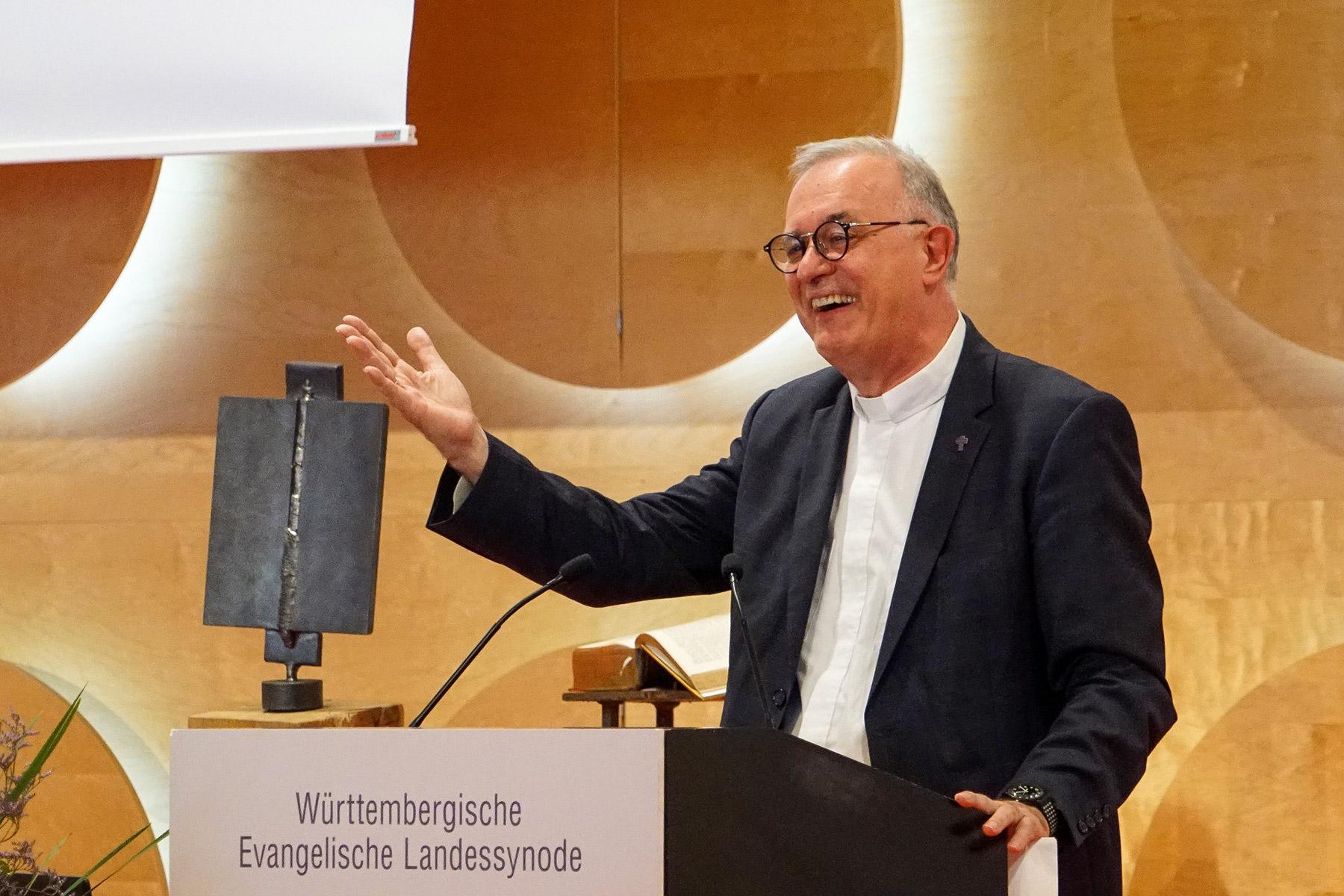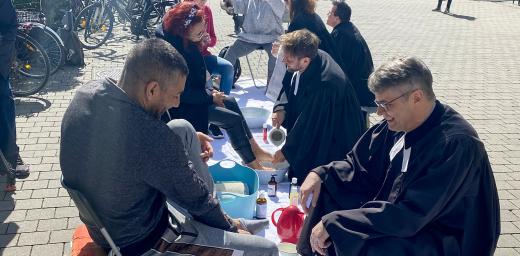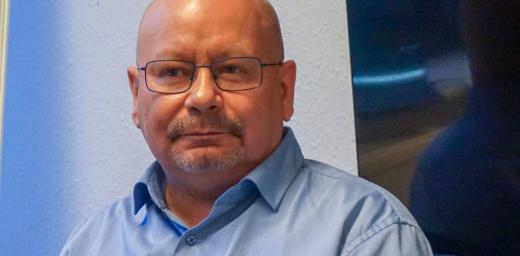(LWI) – “I have exercised my office as bishop as a ministry and service for unity,” said the Bishop of the Evangelical Lutheran Church in Württemberg, Frank Otfried July, in his message to the synod on 9 July. Ecumenism was “a central theme” for him, he underlined.
Members of the synod responded to his speech with a standing ovation. After 17 years in office, July will retire after a festive service on 24 July. His successor, Ernst-Wilhelm Gohl, will be installed during that service. July will continue to serve on the Council of The Lutheran World Federation (LWF) until the Thirteenth Assembly, which will be held in Krakow, Poland, in September 2023.
LWF and ecumenical relations shaped his tenure
Then a circle will be closed. Bishop July described the Eleventh Assembly of the Lutheran World Federation (LWF), held in Stuttgart in July 2010, as a “special moment in these 17 years.” He said that the act of repentance for the condemnation of Anabaptist communities by Lutherans during the Reformation was unforgettable to him.
“Mennonite representatives were present,” July recalled. After the Assembly passed a resolution, “many delegates got down on their knees in the conference hall, saying a prayer of repentance.” Later, a joint eucharist service was held. “This moment showed how the words of a big body, a global institution created reality, a new reality of reconciliation; and we could experience this reality of reconciliation,” July said.
The LWF became “a new chapter in my biography,” July said. He was elected Vice-President for the Central and Western Europe region and became a member of the Executive Committee. Through this, he was involved with “many new international issues and encounters – many of which continue to this day.” That also applies, he said, to his continuing office as chairperson of the German National Committee of the Lutheran World Federation (GNC/LWF) and his commitments at the Institute for Ecumenical Research in Strasbourg. “Perhaps that is psychologically quite good for me,” July said of this transition.
The global church and ecumenism have become a very personal focus, and they also shape our identity as church in Württemberg; the Church of Jesus Christ always has a global reference.
– Bishop Frank Otfried July, Evangelical Lutheran Church in Württemberg
“The global church and ecumenism have not only become one of my very personal focuses,” Bishop July said, “they also shape our identity as a church in Württemberg. The church of Jesus Christ always has a global reference.”
He acknowledged local congregations, where the church can be “fully experienced,” and the connectedness in local communities. Yet, July emphasized: “In the regional church or partnership with other Christians around the world, it is important to listen to others’ insights and questions, to see how God shapes the church in different ways in different forms and cultures.”
Even the LWF, with its specific Lutheran identity, is not a homogeneous body. Here, too, “reconciled diversity” was necessary, July said.
Through his ministry, July had the opportunity to engage in talks at the Vatican and with the Orthodox Church. “To examine and re-examine one’s confessionality in dialogue with other fundamental theological decisions – but also to position oneself in such a dialogue challenged me again and again,” July said.
The complicated situation of the Roman Catholic Church in Germany calls “for fraternal accompaniment, for prayer and for sharing our systemic experiences.” That includes constructive criticism, he said.
“In a society that has changed greatly, I see no appropriate alternative to ecumenical collaboration,” July emphasized. “It has been a spiritual challenge for me to walk the ecumenical path patiently and ambitiously, critically and constructively.”
Kirchentag, a focal point of a Protestant church in German society
The German Protestant Kirchentag takes place every two years. In 2015, it took place in Stuttgart, and Bishop July lists it as a highlight of his “term of office – with many discussions and encounters.” It was for him a “crystallization point of a Protestant church in society.”
“Here, the church makes possible what – in some instances – no longer takes place in society: a community of discourse that offers spaces for discussion, brings people of very different opinions together, and sometimes addresses taboo topics in church and society, even if it hurts; it sometimes hurt me, too,” July said. The Kirchentag, too, was an event to „witness to the hope that is in us“ (1 Peter).
Social responsibility in state and church
The church, its role in society and its relationship with the state were issues for negotiation right at the beginning of July’s term of office. More specifically, this concerned the State-Church Agreement, signed in 2007 between the Evangelical Church in Baden, the Evangelical Lutheran Church in Württemberg and the state of Baden-Württemberg. It regulates matters between the political and church actors, for example, the exercise of freedom of faith, the study of theology at state universities, diaconia, corporate rights or monument preservation.
According to July, it was impressive that the agreement met with broad approval across parties in the state parliament. However, today – 15 years later – “that would no longer be so easy.“
Nevertheless, July underlined: “We live in a state where the government regularly acknowledges and emphasizes the need for collaboration between church and state, and expresses its interest in church matters. However, this is not to be taken for granted and must therefore be carefully cultivated on our part,” Bishop July concluded.
By LWF/A. Weyermüller






